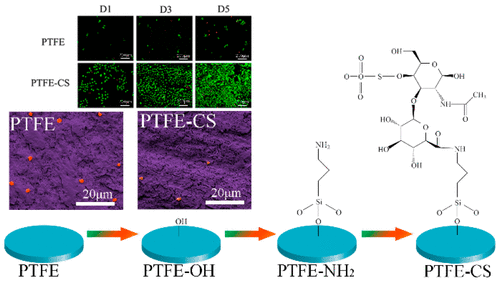当前位置:
X-MOL 学术
›
ACS Appl. Bio Mater.
›
论文详情
Our official English website, www.x-mol.net, welcomes your
feedback! (Note: you will need to create a separate account there.)
Promotion of Endothelial Cell Adhesion and Antithrombogenicity of Polytetrafluoroethylene by Chemical Grafting of Chondroitin Sulfate
ACS Applied Bio Materials ( IF 4.6 ) Pub Date : 2020-01-10 , DOI: 10.1021/acsabm.9b00970 Lei Ma 1, 2 , Xuyan Li 2, 3 , Xin Guo 2, 3 , Yongchao Jiang 1, 2 , XiaoMeng Li 1, 3 , Haiyang Guo 2, 3 , Bo Zhang 2, 3 , Yiyang Xu 1, 2, 4 , Xiaofeng Wang 1, 3 , Qian Li 1, 2, 3
ACS Applied Bio Materials ( IF 4.6 ) Pub Date : 2020-01-10 , DOI: 10.1021/acsabm.9b00970 Lei Ma 1, 2 , Xuyan Li 2, 3 , Xin Guo 2, 3 , Yongchao Jiang 1, 2 , XiaoMeng Li 1, 3 , Haiyang Guo 2, 3 , Bo Zhang 2, 3 , Yiyang Xu 1, 2, 4 , Xiaofeng Wang 1, 3 , Qian Li 1, 2, 3
Affiliation

|
Polytetrafluoroethylene (PTFE) is one of the polymers extensively applied in biomedicine. However, the application of PTFE as a small-diameter vascular graft results in thrombosis and intimal hyperplasia because of the immune response. Therefore, improving the biocompatibility and anticoagulant properties of PTFE is a key to solving this problem. In this study, a hydroxyl group-rich surface was obtained by oxidizing a benzoin-reduced PTFE membrane. Then, chondroitin sulfate (CS), an anticoagulant, was grafted on the surface of the hydroxylated PTFE membrane using 3-aminopropyltriethoxysilane. The successful modification of the membrane in each step was demonstrated by Fourier transform infrared spectroscopy and X-ray photoelectron spectroscopy. Hydroxylation and the grafting of CS greatly increased the hydrophilicity and roughness of membrane samples. Moreover, the hydroxylated PTFE membrane enhanced the adhesion ability of endothelial cells, and the grafting of CS also promoted the proliferation of endothelial cells and decreased platelet adhesion. The results indicate that the PTFE membranes grafted with CS are able to facilitate rapid endothelialization and inhibit thrombus formation, which makes the proposed method outstanding for artificial blood vessel applications.
中文翻译:

硫酸软骨素化学接枝促进聚四氟乙烯内皮细胞粘附和抗血栓形成
聚四氟乙烯(PTFE)是广泛应用于生物医学的聚合物之一。然而,由于免疫反应,PTFE作为小直径血管移植物的应用会导致血栓形成和内膜增生。因此,提高聚四氟乙烯的生物相容性和抗凝性能是解决这一问题的关键。在这项研究中,通过氧化苯偶姻还原的 PTFE 膜获得了富含羟基的表面。然后,使用 3-氨基丙基三乙氧基硅烷将抗凝剂硫酸软骨素 (CS) 接枝到羟基化 PTFE 膜的表面。傅里叶变换红外光谱和 X 射线光电子能谱证明了每个步骤中膜的成功改性。CS的羟基化和接枝大大增加了膜样品的亲水性和粗糙度。此外,羟基化的PTFE膜增强了内皮细胞的粘附能力,CS的移植也促进了内皮细胞的增殖,降低了血小板的粘附。结果表明,与 CS 接枝的 PTFE 膜能够促进快速内皮化并抑制血栓形成,这使得所提出的方法在人造血管应用中表现出色。
更新日期:2020-01-10
中文翻译:

硫酸软骨素化学接枝促进聚四氟乙烯内皮细胞粘附和抗血栓形成
聚四氟乙烯(PTFE)是广泛应用于生物医学的聚合物之一。然而,由于免疫反应,PTFE作为小直径血管移植物的应用会导致血栓形成和内膜增生。因此,提高聚四氟乙烯的生物相容性和抗凝性能是解决这一问题的关键。在这项研究中,通过氧化苯偶姻还原的 PTFE 膜获得了富含羟基的表面。然后,使用 3-氨基丙基三乙氧基硅烷将抗凝剂硫酸软骨素 (CS) 接枝到羟基化 PTFE 膜的表面。傅里叶变换红外光谱和 X 射线光电子能谱证明了每个步骤中膜的成功改性。CS的羟基化和接枝大大增加了膜样品的亲水性和粗糙度。此外,羟基化的PTFE膜增强了内皮细胞的粘附能力,CS的移植也促进了内皮细胞的增殖,降低了血小板的粘附。结果表明,与 CS 接枝的 PTFE 膜能够促进快速内皮化并抑制血栓形成,这使得所提出的方法在人造血管应用中表现出色。











































 京公网安备 11010802027423号
京公网安备 11010802027423号